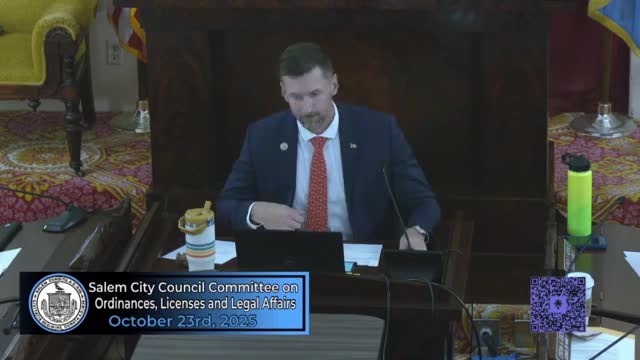Committee delays decision on adding three retail marijuana licenses; two prioritized for social equity applicants
Get AI-powered insights, summaries, and transcripts
Subscribe
Summary
The Salem City Council committee discussed a proposal to increase the city's cap on retail marijuana establishments from five to eight and to reserve two of the new licenses for state-certified social equity or economic empowerment applicants.
The Salem City Council Committee on Ordinances, Licenses and Legal Affairs discussed a proposed change that would increase the city's cap on retail marijuana retail licenses from five to eight and prioritize two of the new licenses for state-certified social equity or economic empowerment applicants.
City Solicitor Beth Renard explained the proposal and described the state-level Social Equity program administered through the Massachusetts Cannabis Control Commission, noting that of roughly 310 approved social equity participants statewide only about 59 to 79 had active retail licenses at the time she reviewed the data. Renard said the local ordinance and zoning code changes are coordinated: the ordinance would raise the numerical cap and the zoning amendment would authorize the additional businesses in appropriate locations.
Councilors asked how the local preference and license-replacement rules would work. Renard said the new regulation would implement a minimum 1-to-1 preference for social equity applicants when a non-social-equity license becomes available ("1 social equity to 1 non social equity"), but that the second replacement license might or might not go to an equity applicant depending on applications. Councilor Massilla asked why only two of the three new licenses were reserved; Renard said the proposed reservation reflects the percentage required under the state regulations.
Mayor Pengalo and several councilors discussed fiscal and consumer impacts. The mayor said Salem currently levies a 3% local excise on cannabis sales and reported collections of about $850,000 in FY 2024 and $690,000 in FY 2025, noting a market decline nationally; he described economic benefits including jobs and commercial property tax base growth but said revenue was not the primary motivation.
Committee discussion focused on sequencing: the ordinance language change and a separate zoning amendment must both be completed before new licenses can be issued. Some councilors urged referring the ordinance to the full council with a positive recommendation; others — including the city solicitor — recommended leaving the matter in committee until a joint public hearing with the Planning Board is held so the zoning map and specific locations can be vetted.
Councilor Cohen initially moved to refer the ordinance to the full council with a positive recommendation but then withdrew that motion and moved to keep the matter in committee so the joint public hearing and zoning review can proceed. The committee approved the motion to remain in committee.
What happens next: the zoning amendment for the corresponding increase in retail marijuana establishments will require a joint public hearing with the Planning Board; the Committee left the ordinance in committee until the Planning Board process and a joint public hearing produce a recommendation.
